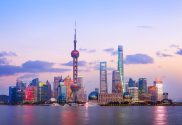In 1968, astronaut Frank Borman said, “When you’re finally up at the moon looking back on Earth, all those differences and nationalistic traits are pretty well going to blend, and you’re going to get a concept that maybe this really is one world and why the hell can’t we learn to live together like decent people?” This seems to ring truer over time as technology changes the patterns that have shaped those nationalistic traits for millennia.
Yet we still tend to think in terms of nation-states, which themselves are merely a social construct. When Borman saw the Earth from the moon, he didn’t see borders and boundaries. The only indications of human groupings on the Earth he saw from space were the city lights illuminating the night skies.
That image hints at a more useful way of categorizing human interactions: the hub. A hub is not necessarily a physical location, but a center of shared activity that’s constantly evolving and being organized through the internet and other technological avenues. Human gravitation toward the hub has begun, with digital nomads shopping for new homes, evaluating countries by variables from internet speed to tax regulations, rather than accepting their birth nations. This represents a change from a longstanding pattern, a shift that’ll need to be fully understood if the hope is to thrive in this new digital reality.
The Roots of Traditional Power Structures
Nation-states exist to protect citizens. They are supported by military force and depend on people’s trust in their governments. That faith is a product of one’s cultural upbringing and a surrounding network of community members who share the same cultural values. It builds confidence in the entire civic structure, including a nation-state’s ability to care for its people.
How countries accomplish that varies. Communism promised equal outcomes for everyone, while the U.S. intends to protect equal opportunities for all. These promises and protections were necessary because people lived in an era of scarcity in which the availability of necessary resources was never a guarantee.
When significant resources were discovered — such as a mine of the metals used for weapons and tools — power structures coalesced around it. Those who controlled these resources became dominant and planted the seeds of a new nation-state. The small group of elites who control the lion’s share of petroleum in the Middle East prove that this model is still highly relevant.
Thanks to technology, however, this antiquated pattern is changing. Though we are still powerfully motivated by scarcity, we’re entering an age of abundance. For example, if we can get to the point where solar power meets most of our energy needs, oil and natural gas will lose reverence. Hypothetically, this should dissolve power structures based on these resources, resulting in more fluid and dynamic societies united by common interests rather than by a need to protect limited resources.
The Anger Behind Populism
When citizens suspect the dearth of good resources is due to poor distribution, it creates a resentment. This feeling is exacerbated when governments are too often shown to be corrupt or negligent in protecting the “pursuit of happiness” that every person wants. The recent vote of no confidence of the Spanish government and ouster of Prime Minister Mariano Rajoy conveys people’s willingness to rebel against traditional power structures.
In the U.S., we’ve seen this resentment materialize when government officials fail to keep their promises. Many are skeptical that the government can fulfill the future demands of federal entities such as Social Security and Medicare, which erodes the trust the country was first founded upon all those years ago.
Yet the belief in human innovation and potential continues to inspire us. Elon Musk, for instance, is so revered because he continually pushes to search for answers to long-term issues and complex challenges, even when there’s no guarantee of success.
Many of us root for him because we’re ultimately rooting for all of us. That same feel-good morale surrounds the entire tech sector these days, including Musk, the Bill & Melinda Gates Foundation, Amazon’s current round of innovations, or the latest offering from some forward-thinking startups. In contrast, there’s rarely much buzz about what the government is doing.
Those who can adapt and embrace new tech put themselves at an advantage. Napoleon logged military success because he was an early adopter of the light cannon. The cannon was known as a universal artillery that could devastate opponents from near and far.
The versatility of the apparatus gave Napoleon’s infantry an edge on the competition. In that same vein, early tech adopters willing to take risks will position themselves in the path of opportunity. They will be less reliant on government as private innovation outpaces it and base their partnerships on convenience, taxation, and regulation instead of location and cultural identifiers.
We should embrace these new distributed power structures and seek political change that supports and enhances them. From medical cures to communications breakthroughs, it’s an exciting future, one worth calling a new epoch in the human story.
For so long, we’ve allowed regionality to define how we connect with others. Isn’t it time we let technology allow us to relate to one another on a larger scale?





